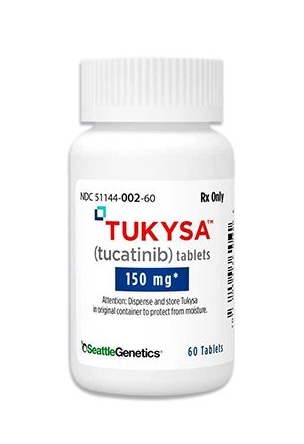Keytruda (pembrolizumab) vs Tukysa (tucatinib)
Keytruda (pembrolizumab) vs Tukysa (tucatinib)
Keytruda (pembrolizumab) is an immune checkpoint inhibitor used primarily for various types of cancers, including melanoma, lung, and head and neck cancers, by enhancing the body's immune response against cancer cells. Tukysa (tucatinib) is a tyrosine kinase inhibitor specifically indicated for the treatment of HER2-positive breast cancer, often used in combination with other cancer therapies. When deciding between Keytruda and Tukysa, it is essential to consider the type of cancer being treated, as Keytruda is not specific to HER2-positive cancers, whereas Tukysa is targeted for that particular subtype of breast cancer.
Difference between Keytruda and Tukysa
| Metric | Keytruda (pembrolizumab) | Tukysa (tucatinib) |
|---|---|---|
| Generic name | Pembrolizumab | Tucatinib |
| Indications | Various types of cancers including melanoma, lung cancer, head and neck cancer, Hodgkin lymphoma, and others | HER2-positive breast cancer |
| Mechanism of action | Programmed death receptor-1 (PD-1) blocking antibody | Tyrosine kinase inhibitor that selectively inhibits the kinase activity of HER2 |
| Brand names | Keytruda | Tukysa |
| Administrative route | Intravenous infusion | Oral |
| Side effects | Fatigue, musculoskeletal pain, decreased appetite, pruritus, diarrhea, nausea, rash, pyrexia, cough, dyspnea, constipation, pain in extremity, and headache | Diarrhea, palmar-plantar erythrodysesthesia syndrome, nausea, fatigue, hepatotoxicity, vomiting, stomatitis, decreased appetite, abdominal pain, headache, anemia, and rash |
| Contraindications | Individuals with hypersensitivity to pembrolizumab or any of its excipients | Individuals with hypersensitivity to tucatinib or any of its excipients |
| Drug class | Immune checkpoint inhibitor | Tyrosine kinase inhibitor |
| Manufacturer | Merck & Co. | Seagen Inc. |
Efficacy
Keytruda (Pembrolizumab) Efficacy in Breast Cancer
Keytruda, also known by its generic name pembrolizumab, is an immunotherapy drug that has shown efficacy in treating certain types of breast cancer. Pembrolizumab is a programmed death receptor-1 (PD-1) blocking antibody that works by enhancing the body's immune response against cancer cells. Its use in breast cancer is typically limited to patients with metastatic triple-negative breast cancer (TNBC) that expresses PD-L1, as determined by an FDA-approved test. The efficacy of pembrolizumab in breast cancer was demonstrated in clinical trials where it was combined with chemotherapy. Patients receiving pembrolizumab in combination with chemotherapy showed a significant improvement in progression-free survival compared to chemotherapy alone. However, pembrolizumab is not universally effective for all breast cancer patients and is most beneficial in a subset of individuals with specific biomarkers.
Tukysa (Tucatinib) Efficacy in Breast Cancer
Tukysa, with the generic name tucatinib, is a tyrosine kinase inhibitor that has been approved for use in combination with trastuzumab and capecitabine for the treatment of adult patients with advanced unresectable or metastatic HER2-positive breast cancer. This includes patients who have received at least one prior anti-HER2-based regimen in the metastatic setting. Tucatinib targets the HER2 protein, which can promote the growth of cancer cells. In a pivotal clinical trial, the addition of tucatinib to trastuzumab and capecitabine was shown to significantly reduce the risk of disease progression or death by 46% compared to trastuzumab and capecitabine alone. Furthermore, tucatinib has demonstrated an increase in overall survival in patients with HER2-positive metastatic breast cancer, offering a valuable treatment option for this aggressive form of the disease.
Comparative Efficacy in Breast Cancer Treatment
While both Keytruda and Tukysa have shown efficacy in the treatment of breast cancer, their applications are distinct and cater to different subsets of the breast cancer population. Keytruda is most effective in PD-L1 positive triple-negative breast cancer, which lacks estrogen, progesterone, and HER2 receptors. On the other hand, Tukysa is specifically designed for patients with HER2-positive breast cancer, which overexpresses the HER2 protein. The efficacy of these drugs is highly dependent on the presence of specific biomarkers, and they represent the advancement of personalized medicine in cancer treatment.
Conclusion
In conclusion, both Keytruda and Tukysa have made significant strides in the treatment of breast cancer, offering hope to patients with specific types of advanced or metastatic disease. Their efficacy underscores the importance of biomarker testing in determining the most effective treatment course for breast cancer patients. As research continues, the potential for these drugs to improve outcomes for breast cancer patients remains an area of active investigation and optimism within the medical community.
Regulatory Agency Approvals
Keytruda
-
European Medical Agency (EMA), European Union

-
Food and Drug Administration (FDA), USA

-
Health Canada

-
Therapeutic Goods Administration (TGA), Australia

-
Medsafe (NZ)

Tukysa
-
European Medical Agency (EMA), European Union

-
Food and Drug Administration (FDA), USA

-
Health Canada

-
Therapeutic Goods Administration (TGA), Australia

-
Swissmedic (CH)

Access Keytruda or Tukysa today
If Keytruda or Tukysa are not approved or available in your country (e.g. due to supply issues), you can access them via Everyone.org.
How it works

Make an enquiry
Choose the medicine you want to buy, answer a couple of questions, and upload your prescription to speed things up. We’ll get back to you within 24 hours.


Make an enquiry
Choose the medicine you want to buy, answer a couple of questions, and upload your prescription to speed things up. We’ll get back to you within 24 hours.


Breeze through the paperwork
We'll guide you through the required documents for importing unapproved medicine, ensuring you have all the necessary information.


Get a personalized quote
We’ll prepare a quote for you, including medicine costs and any shipping, administrative, or import fees that may apply.


Receive your medicine
Accept the quote and we’ll handle the rest - sourcing and safely delivering your medicine.

Some text on this page has been automatically generated. Speak to your physician before you start a new treatment or medication.
Let's talk
If you have any questions, call us or send us a message through WhatsApp or email:
Contact us




